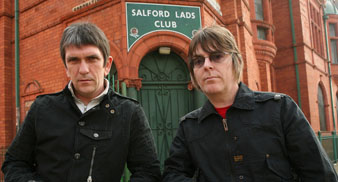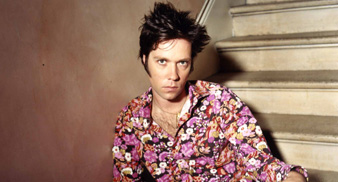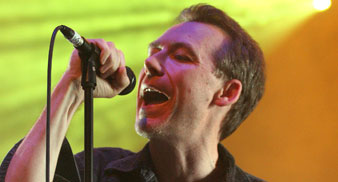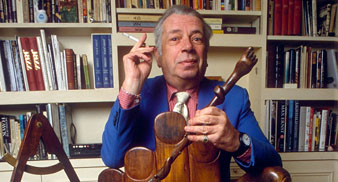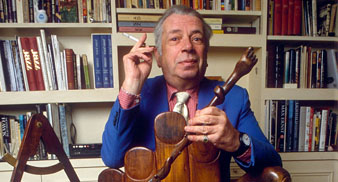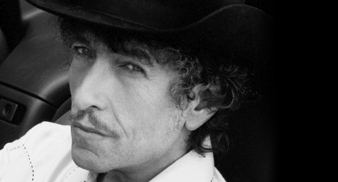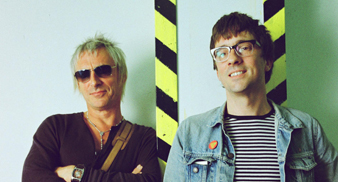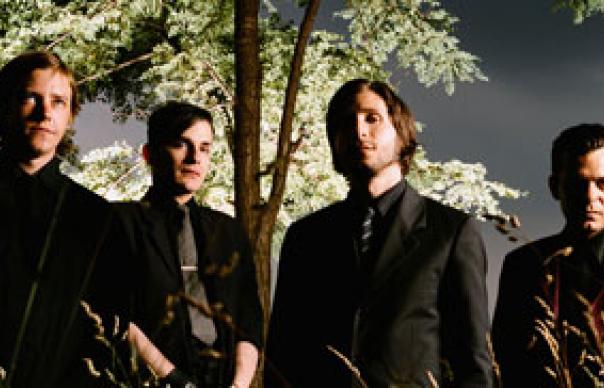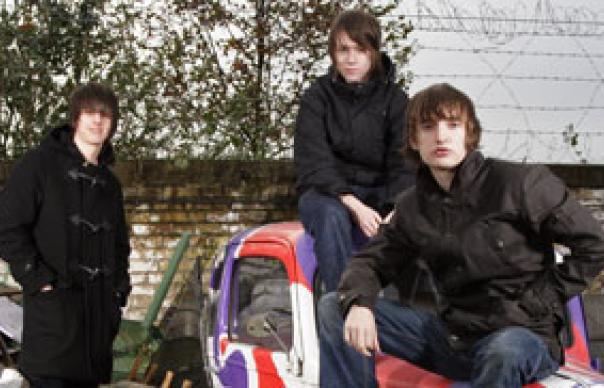After a muddy and murky start on Friday, Brian Wilson ended the first full day of this year’s T In The Park festival by bringing the sunshine to Scotland. Not literally, but it’s as close as we’d come so far.
T In The Park Friday and Saturday
Live Earth London
Within seven minutes of BBC1 picking up live coverage, Chris Rock gets in the first “C’mon motherfuckers”. This shortly after David Gray and Damien Rice have murdered “Que Sera Sera”, Snow Patrol have yelled, “Looking forward to Spinal Tap? We are!” and Geri Halliwell has walked onstage to say, “Isn‘t it great my band are back together?” While the eight concerts around the world constitute an immense, well-intended event, the Wembley show is a thoroughly surreal mish-mash of deafening hard rock, weightless aerobic pop and celebs spouting platitudes.
Smiths Screening and Q&A Moved To London Cinema
The upcoming 'Inside The Smiths' documentary screening and Q&A with original Smiths members Andy Rourke and Mike Joyce has had a venue change. Originally planned to take place at Fopp record store on London's Tottenham Court Road, due to the shop's closure, it will now take place at The Renoir Cinema near Russell Square, WC1 on July 19. As previously reported, the band's first DVD documentary tells the history of the band from their own perspective. 'Inside The Smiths' includes contributions from original Smiths snapper Stephen Wright, and in depth interviews with the former Smiths as well as musician friends and fans such as New Order's Peter Hook, The Fall's Mark E Smith and Buzzcocks' Pete Shelley. The Manchester screening is still taking place at TV21, Thomas Street on July 15. Tickets for the London premiere are £6.50 and are available from www.curzoncinemas.comhere
The upcoming ‘Inside The Smiths’ documentary screening and Q&A with original Smiths members Andy Rourke and Mike Joyce has had a venue change.
Originally planned to take place at Fopp record store on London’s Tottenham Court Road, due to the shop’s closure, it will now take place at The Renoir Cinema near Russell Square, WC1 on July 19.
As previously reported, the band’s first DVD documentary tells the history of the band from their own perspective.
‘Inside The Smiths’ includes contributions from original Smiths snapper Stephen Wright, and in depth interviews with the former Smiths as well as musician friends and fans such as New Order’s Peter Hook, The Fall’s Mark E Smith and Buzzcocks’ Pete Shelley.
The Manchester screening is still taking place at TV21, Thomas Street on July 15.
Tickets for the London premiere are £6.50 and are available from
Countdown to Latitude… Damien Rice
 DAMIEN RICE
DAMIEN RICE
Irish troubadour Rice distinguished himself from the weedy, confessional singer-songwriter pack early on with his debut album from 2002, ‘O’, working strings, gnarled blues and sexual frankness into his contemporary folk mix.
Ask Rufus Wainwright Anything
We're is speaking to Rufus Wainwright tomorrow for our An Audience With... feature -- where you, the fans, put questions to the great musicians. So, is there anything you've always wanted to ask Rufus? How fulfilling was doing a Dorothy? Did doing a full Judy Garland show fulfill a dream? Has Brandon Flowers requited his love? How nurturing is he of sister Martha's career? Which is his favourite festival place toplay in the world? The funnier -- and more off-the-wall -- the better! Send your questions by 5pm tomorrow to: uncutaudiencewith@ipcmedia.com
We’re is speaking to Rufus Wainwright tomorrow for our An Audience With… feature — where you, the fans, put questions to the great musicians.
So, is there anything you’ve always wanted to ask Rufus?
How fulfilling was doing a Dorothy? Did doing a full Judy Garland show fulfill a dream?
Has Brandon Flowers requited his love?
How nurturing is he of sister Martha’s career?
Which is his favourite festival place toplay in the world?
The funnier — and more off-the-wall — the better!
Send your questions by 5pm tomorrow to:
uncutaudiencewith@ipcmedia.com
Lou Reed Contributes To Anderson’s Big Science
A new recording of Laurie Anderson’s 1981 single ‘Big Science’ is to be released coinciding with the 25th anniversary reissue of her debut album, ‘Big Science.’ Featuring contributions from Lou Reed and Antony Hegarty, on the reworking of ‘Big Science 2'; this is the second time Reed, Hegarty and Laurie have recorded together - the three artists sang on Lou Reed’s album 2003 album ‘Raven.’ The 'Big Science 2' EP also features a remastered version of Anderson's renowned track 'O Superman' which is based around French operatic aria 'O Souverain.' As described in a four-star album review in this month’s birthday edition of UNCUT, the song "with its minimal pulse and vocoderised intonations, reflected a theme central to the time, that of a fear of rapidly expanding technology." Uncut.co.uk has a video stream of 'O Superman' for you to view by clicking here: Windows Media lo / hi Real media lo / hi The 'Big Science EP' is reissued by Nonesuch Records on July 16. Pic credit: Noah Greenberg
A new recording of Laurie Anderson’s 1981 single ‘Big Science’ is to be released coinciding with the 25th anniversary reissue of her debut album, ‘Big Science.’
Featuring contributions from Lou Reed and Antony Hegarty, on the reworking of ‘Big Science 2′; this is the second time Reed, Hegarty and Laurie have recorded together – the three artists sang on Lou Reed’s album 2003 album ‘Raven.’
The ‘Big Science 2’ EP also features a remastered version of Anderson’s renowned track ‘O Superman’ which is based around French operatic aria ‘O Souverain.’
As described in a four-star album review in this month’s birthday edition of UNCUT, the song “with its minimal pulse and vocoderised intonations, reflected a theme central to the time, that of a fear of rapidly expanding technology.”
Uncut.co.uk has a video stream of ‘O Superman’ for you to view by clicking here:
Windows Media
Real media
The ‘Big Science EP’ is reissued by Nonesuch Records on July 16.
Pic credit: Noah Greenberg
Jesus and Mary Chain To Play Brixton Show
The Jesus & Mary Chain are to play a one-off show at London’s Brixton Academy on September 7. The newly reformed band made their first live appearance in nine years at US music bash, Coachella Festival in April and they have played only one show in London so far. They played at London’s Royal Festival Hall, as part of Meltdown, on June 22. The Jesus & Mary Chain current line-up is Jim and William Reid, Mark Crozer, former Lush bassist Phil King, and Ride drummer Loz Colbert. As well as the announced Brixton show, JAMC are scheduled to play at several European summer festivals, including Summercase and Paris Rock En Seine. Catch the Reids and co at the following places from the end of the month: Summercase Festival, Madrid, Spain (July 13) Summercase Festival, Barcelona (14) OYA Festival, Oslo, Norway (August 10) M'era Luna Festival, Hildesheim, Germany (12) Rock En Seine, Paris, France (25) Connect Festival, Scotland (31) Laois Electric Picnic, Stradbelly, Ireland (September 1) Brixton Academy, London (7)
The Jesus & Mary Chain are to play a one-off show at London’s Brixton Academy on September 7.
The newly reformed band made their first live appearance in nine years at US music bash, Coachella Festival in April and they have played only one show in London so far. They played at London’s Royal Festival Hall, as part of Meltdown, on June 22.
The Jesus & Mary Chain current line-up is Jim and William Reid, Mark Crozer, former Lush bassist Phil King, and Ride drummer Loz Colbert.
As well as the announced Brixton show, JAMC are scheduled to play at several European summer festivals, including Summercase and Paris Rock En Seine.
Catch the Reids and co at the following places from the end of the month:
Summercase Festival, Madrid, Spain (July 13)
Summercase Festival, Barcelona (14)
OYA Festival, Oslo, Norway (August 10)
M’era Luna Festival, Hildesheim, Germany (12)
Rock En Seine, Paris, France (25)
Connect Festival, Scotland (31)
Laois Electric Picnic, Stradbelly, Ireland (September 1)
Brixton Academy, London (7)
George Melly RIP
Legendary jazz and blues singer, George Melly passed away this morning, at his home in London at the age of 80. The singer refused lung cancer treatment after being diagnosed in 2005 and collapsed on stage in January this year. However he continued to perform, with his last public appearance just last month. Melly’s final performance was at the 100 Club in London on June 10 where he raised money for Admiral Nurses, part of the charity For Dementia, a disease that he was also diagnosed with. Born in Liverpool in 1926, Melly lived a life full of creativity and excitement. As well as being a much loved jazz singer for over 60 years, Melly was also a lecturer on art and history and a television and film critic as well as a writer. Influenced strongly by Bessie Smith, Melly has performed as part of Digby Fairweather’s band and Mick Mulligan’s band as well as making a long lasting solo career for himself. His spectacular jazz performances were always intertwined with outrageous jokes and humerous anecdotes for which many fans will remember him. Clothed in vibrant suits and extravagant cowboy hats, the singer was also a keen fisherman (which led him to buy part of the River Usk in Wales) and a dedicated lover of fine art, particularly Surrealism. Although the singer performed up until the last few weeks of his life, the highlight of Melly’s musical career was during the mid-seventies when he released three albums in quick succession. ‘Nuts’ was released in 1972, ‘Son Of Nuts’ in 1973 and ‘It’s George’ in 1974. Leave a comment here Pic credit: Rex Features
Legendary jazz and blues singer, George Melly passed away this morning, at his home in London at the age of 80.
The singer refused lung cancer treatment after being diagnosed in 2005 and collapsed on stage in January this year. However he continued to perform, with his last public appearance just last month.
Melly’s final performance was at the 100 Club in London on June 10 where he raised money for Admiral Nurses, part of the charity For Dementia, a disease that he was also diagnosed with.
Born in Liverpool in 1926, Melly lived a life full of creativity and excitement. As well as being a much loved jazz singer for over 60 years, Melly was also a lecturer on art and history and a television and film critic as well as a writer.
Influenced strongly by Bessie Smith, Melly has performed as part of Digby Fairweather’s band and Mick Mulligan’s band as well as making a long lasting solo career for himself.
His spectacular jazz performances were always intertwined with outrageous jokes and humerous anecdotes for which many fans will remember him.
Clothed in vibrant suits and extravagant cowboy hats, the singer was also a keen fisherman (which led him to buy part of the River Usk in Wales) and a dedicated lover of fine art, particularly Surrealism.
Although the singer performed up until the last few weeks of his life, the highlight of Melly’s musical career was during the mid-seventies when he released three albums in quick succession.
‘Nuts’ was released in 1972, ‘Son Of Nuts’ in 1973 and ‘It’s George’ in 1974.
Pic credit: Rex Features
George Melly RIP
Legendary jazz and blues singer, George Melly passed away this morning, at his home in London at the age of 80. The singer refused lung cancer treatment after being diagnosed in 2005 and collapsed on stage in January this year. However he continued to perform, with his last public appearance just last month. Melly’s final performance was at the 100 Club in London on June 10 where he raised money for Admiral Nurses, part of the charity For Dementia, a disease that he was also diagnosed with. Born in Liverpool in 1926, Melly lived a life full of creativity and excitement. As well as being a much loved jazz singer for over 60 years, Melly was also a lecturer on art and history and a television and film critic as well as a writer. Influenced strongly by Bessie Smith, Melly has performed as part of Digby Fairweather’s band and Mick Mulligan’s band as well as making a long lasting solo career for himself. His spectacular jazz performances were always intertwined with outrageous jokes and humerous anecdotes for which many fans will remember him. Clothed in vibrant suits and extravagant cowboy hats, the singer was also a keen fisherman (which led him to buy part of the River Usk in Wales) and a dedicated lover of fine art, particularly Surrealism. Although the singer performed up until the last few weeks of his life, the highlight of Melly’s musical career was during the mid-seventies when he released three albums in quick succession. ‘Nuts’ was released in 1972, ‘Son Of Nuts’ in 1973 and ‘It’s George’ in 1974. Pic credit: Rex Features
Legendary jazz and blues singer, George Melly passed away this morning, at his home in London at the age of 80.
The singer refused lung cancer treatment after being diagnosed in 2005 and collapsed on stage in January this year. However he continued to perform, with his last public appearance just last month.
Melly’s final performance was at the 100 Club in London on June 10 where he raised money for Admiral Nurses, part of the charity For Dementia, a disease that he was also diagnosed with.
Born in Liverpool in 1926, Melly lived a life full of creativity and excitement. As well as being a much loved jazz singer for over 60 years, Melly was also a lecturer on art and history and a television and film critic as well as a writer.
Influenced strongly by Bessie Smith, Melly has performed as part of Digby Fairweather’s band and Mick Mulligan’s band as well as making a long lasting solo career for himself.
His spectacular jazz performances were always intertwined with outrageous jokes and humerous anecdotes for which many fans will remember him.
Clothed in vibrant suits and extravagant cowboy hats, the singer was also a keen fisherman (which led him to buy part of the River Usk in Wales) and a dedicated lover of fine art, particularly Surrealism.
Although the singer performed up until the last few weeks of his life, the highlight of Melly’s musical career was during the mid-seventies when he released three albums in quick succession.
‘Nuts’ was released in 1972, ‘Son Of Nuts’ in 1973 and ‘It’s George’ in 1974.
Pic credit: Rex Features
Countdown to Latitude…Clap Your Hands Say Yeah
 CLAP YOUR HANDS SAY YEAH
CLAP YOUR HANDS SAY YEAH
Brooklyn five piece Clap Your Hands Say Yeah are one of a bunch of north American bands – The Shins, Modest Mouse, and Broken Social Scene among them – revising what is meant by indie pop…
Rilo Kiley’s “Under The Blacklight”
To be honest, the success of Rilo Kiley has been pretty bewildering to me up 'til now. Much as I liked Jenny Lewis' country solo album, "Rabbit Fur Coat", I never grasped the appeal of her band. For all her likeable LA snarkiness, their music always sounded like a grey jangle; as if the American mainstream had embraced, what, The Sundays maybe, as the future of music. Quite strange, but in quite a dull way. For the past couple of weeks, though, I've been hammering their new album, "Under The Blacklight", and now I understand. Not that, unless my memory is playing tricks on me, "Under The Blacklight" sounds much like Rilo Kiley's previous records. Instead, it's a bright, wry confection that resembles a clever indie kid's fantasy of LA pop music. Maybe you've never been to California, maybe you can't drive, maybe you're being a touch ironic, but surely this is the sort of record you should listen to while you're motoring along the Pacific Coast Highway? Jenny Lewis, it transpires, is tremendously good at this sort of thing. "Under The Blacklight" is one of those albums which is simultaneously knowing and celebratory. She doesn't have indie guilt, exactly, but she's clearly smart enough to see the richness and the absurdities of her hometown and its signature pop sound. There are vague hints of sleaze and misdemeanour amongst the silvery disco guitars, the dry, finickety funk. "Dreamworld", as you'd imagine, is a Fleetwood Mac homage lustrous enough to sit on "Tango In The Night", though the gently subversive Lewis contrives to sound more like Lindsey Buckingham than Stevie Nicks. And beneath the precision gloss, each listen reveals a few odd things. "Close Call" is one of Lewis' elaborate, compelling narratives, which begins "She Was Born On Brighton Pier", while the guitars chime insouciantly in weird homage to The Stone Roses and "I Wanna Be Adored". There are little melodic echoes of things I don't like that much throughout: "Amazing Grace" on "Silver Lining"; "La Isla Bonita" on "Dejalo"; Rainbow's "Since You Been Gone" on "Breakin' Up". But these vague allusions help to make "Under The Blacklight" sound instantly familiar and ready for the charts - or at least an indie idea of what the charts should be. "Breakin' Up" is especially great, a brash and liberated song about separation with a chorus of, "Oh, it feels good to be free," that at once feels euphoric and calculated. It occurs to me, though, with the American mainstream's current indie fetish (for the Arcade Fire, Modest Mouse, The Shins et al) that Rilo Kiley might have made a theoretically commercial record at precisely the wrong time. Be interesting to see how this one pans out. . .
To be honest, the success of Rilo Kiley has been pretty bewildering to me up ’til now. Much as I liked Jenny Lewis‘ country solo album, “Rabbit Fur Coat”, I never grasped the appeal of her band. For all her likeable LA snarkiness, their music always sounded like a grey jangle; as if the American mainstream had embraced, what, The Sundays maybe, as the future of music. Quite strange, but in quite a dull way.
Today’s Uncut soundtrack
Reeling somewhat from the news that Bob Dylan has permitted Mark Ronson to remix "Most Likely You Go Your Way (And I'll Go Mine)", it occurs to me that there's not much time to file a blog today. Here, instead, is what we've played today in the Uncut office - 1 Bert Jansch - Jack Orion 2 Iron And Wine - The Shepherd's Dog 3 Arctic Monkeys - Fluorescent Adolescent 4 Bert Jansch & John Renbourn - Bert & John 5 Rilo Kiley - Under The Blacklight 6 Fairport Convention - Liege And Lief 7 The Assemble Head In Sunburst Sound - Ekranplan 8 Effi Briest - Mirror Rim 9 Fleetwood Mac - The Chain The Reviews Ed is on something of a Bert binge, as you can see. The Iron And Wine record arrived today, and I'll be putting something up about that in the next few days. Ditto the Rilo Kiley and also The Assemble Head In Sunburst Sound - the latter is exceptionally hairy stoner psych that, on first listen, might see them as the natural successors to Comets On Fire. Apologies for the tease. I'll write something more substantial tomorrow.
Reeling somewhat from the news that Bob Dylan has permitted Mark Ronson to remix “Most Likely You Go Your Way (And I’ll Go Mine)”, it occurs to me that there’s not much time to file a blog today. Here, instead, is what we’ve played today in the Uncut office –
Major Bob Dylan Retrospective On Its Way
A major Bob Dylan box set is released by Sony BMG on October 1, preceded by a remix of one of his classic songs by Lily Allen and Amy Winehouse producer Mark Ronson.. The three-CD retrospective, titled simply 'Dylan', features 51 tracks, covers five decades of Dylan’s career and comes in three versions – a deluxe edition featuring the three discs in a cloth covered case and accompanied by an extended booklet of rare and unseen Dylan photos as well as 10 limited edition postcards from key moments in his history. There is also an 18-song Best Of edition, available as a single disc. Content for the three CDs is still being finalised, but will be influenced by fans who can vote for their favourite tracks on the official Bob website, dylan07.com. The website now features artwork for the compilation, plus a promotional trailer for the album, as well as details of a unique online photo exhibition featuring contributions from celebrities and fans who have been inspired by Dylan’s music. Meanwhile, Mark Ronson’s remix of “Most Likely You Go Your Way (And I’ll Go Mine)” will have its global radio premiere on August 1. “I’m a huge Dylan fan, so it’s a great honour,” says Ronson, as a major shudder goes through massed worldwide ranks of Bob fans.
A major Bob Dylan box set is released by Sony BMG on October 1, preceded by a remix of one of his classic songs by Lily Allen and Amy Winehouse producer Mark Ronson..
The three-CD retrospective, titled simply ‘Dylan’, features 51 tracks, covers five decades of Dylan’s career and comes in three versions – a deluxe edition featuring the three discs in a cloth covered case and accompanied by an extended booklet of rare and unseen Dylan photos as well as 10 limited edition postcards from key moments in his history. There is also an 18-song Best Of edition, available as a single disc.
Content for the three CDs is still being finalised, but will be influenced by fans who can vote for their favourite tracks on the official Bob website, dylan07.com.
The website now features artwork for the compilation, plus a promotional trailer for the album, as well as details of a unique online photo exhibition featuring contributions from celebrities and fans who have been inspired by Dylan’s music.
Meanwhile, Mark Ronson’s remix of “Most Likely You Go Your Way (And I’ll Go Mine)” will have its global radio premiere on August 1.
“I’m a huge Dylan fan, so it’s a great honour,” says Ronson, as a major shudder goes through massed worldwide ranks of Bob fans.
Weller and Coxon To Release Joint Single
Paul Weller and Graham Coxon have collaborated on three new tracks together, for the third release from the Regal Singles Club. The three-track, AAA-sided single will be available digitally on July 2, followed by a limited 500-run on 7" vinyl. Lead track on the release is called 'This Old Town,' and is a Coxon/Weller collaboration. 'Each New Morning' is a Graham Coxon composition and final track 'Black River' was written by Paul Weller. Drumming duties on 'This Old Town' are performed by Oasis' drummer Zak Starkey. Talking about the collaboration, Graham Coxon said: "As a long time admirer of Paul I never dared imagine getting a chance to work with him so I was bricking it when we first met...but he is an absolute gent and a shockingly great singer and musician. It’s been a total pleasure." Weller has already returned the compliment by saying “I’ve always been a big fan of Grahams and love his work so it was exciting for me to work on something new with him."
Paul Weller and Graham Coxon have collaborated on three new tracks together, for the third release from the Regal Singles Club.
The three-track, AAA-sided single will be available digitally on July 2, followed by a limited 500-run on 7″ vinyl.
Lead track on the release is called ‘This Old Town,’ and is a Coxon/Weller collaboration. ‘Each New Morning’ is a Graham Coxon composition and final track ‘Black River’ was written by Paul Weller.
Drumming duties on ‘This Old Town’ are performed by Oasis’ drummer Zak Starkey.
Talking about the collaboration, Graham Coxon said: “As a long time admirer of Paul I never dared imagine getting a chance to work with him so I was bricking it when we first met…but he is an absolute gent and a shockingly great singer and musician. It’s been a total pleasure.”
Weller has already returned the compliment by saying “I’ve always been a big fan of Grahams and love his work so it was exciting for me to work on something new with him.”
Countdown to Latitude…Cherry Ghost
 CHERRY GHOST
CHERRY GHOST
Bolton native Simon Aldred is Cherry Ghost – although he plays and records with a quintet – and took the name for his bittersweet, slightly country-tinged pop project from a Wilco song.
Interpol – Our Love To Admire
Interpol, to lapsed punks of a certain age, must look like a Not The Nine O’Clock News parody of a post-punk band. Geeky yet sinister, imperious to the point of self-parody, their skinny ties, armbands and Hitler Youth haircuts seem stuck in a peculiar vintage of rock history. They recall a time when miserable young men from the north of England were staring into the mid-distance, and wearing long trenchcoats.
Now Interpol’s doom-laden vocals, choppy guitar riffs and wiry, hypnotic basslines find themselves providing the soundtrack to the ongoing post-punk revival, as a whole generation of teenagers and twentysomethings continue to party like it’s 1979. The New York quartet, now in their tenth year and on their third album proper, were at the forefront of this New Wave of New Wave, sneaking in before other pale, literate, wasp-waisted young men like Franz Ferdinand, Editors, The Departure, Bloc Party and Hot Hot Heat, could get on board.
Unlike most of these likeminded revivalists, Interpol found many post-punk legends dutifully reciprocating their affections: Robert Smith, Bernard Sumner and Peter Hook have all cited them approvingly, REM have covered one of their songs (the beautifully bleak “NYC”, from Interpol’s first album), and a recent low-key London gig attracted dozens of premier league guitar bands, all joining Coldplay, Gwyneth Paltrow and the Primrose Hill mob.
Britain’s enthusiastic embrace of Interpol has much to do with the band’s perceived Anglophilia. Both singer Paul Banks and lead guitarist Daniel Kessler were born in Blighty and moved to the States as children; John Peel was an early champion of their work, some of which was released on the British imprints Chemikal Underground and Fierce Panda; while singer Paul Banks’s blank-voiced holler is often compared to that of Joy Division’s Ian Curtis and The Chameleons’ Mark “Birdy” Burgess. And, like the two previous albums Turn On The Bright Lights and Antics, Our Love To Admire borrows much of its nervous energy from several obvious English forebears: Echo And The Bunnymen, The Cure, Kitchens Of Distinction, Psychedelic Furs and early Banshees, as well as Joy Division and The Chameleons.
The key difference is that Interpol, as Americans, aren’t hampered by the low-key provincialism that stifled the ambitions of much British post punk. Our Love To Admire – their first album for a major label – suggests that Interpol are primed and ready to complete the leap into the arena circuit, a move that Echo And The Bunnymen, for instance, never felt comfortable with. It’s a majestic, grandiose, machine-tooled album, subtly orchestrated with gothic pianos and doomy organs.
In terms of scale and dynamics, it shares much with U2 and Simple Minds (The Edge’s epic, cinematic guitar style has always been an unacknowledged influenced on Interpol’s Daniel Kessler) but where those Celtic rockers only started to hit stadium dimensions by jettisoning post-punk’s depressive tropes (betrayal, angst, distrust, paranoia, claustrophobia, etc) and adopting a positive, evangelical fervour, Interpol retain Joy Division’s monochrome, self-loathing template and yet make it sound bigger than Bono. This is truly navel gazing taken to giant proportions; a Fassbinder film being made on a Jerry Bruckheimer budget.
The opening track “Pioneer To The Falls”, with its doomy gothic keyboards, spellbinding tremolo guitar solo, and Augustus Pablo-ish line played on an oboe, shows how the quartet have moved on from the bare bones of their earlier albums. This is not a retread of Antics, it is a massive upgrade, an album where the songwriting, production and arrangements blow even Antics’ highpoints like “C’Mere” and “Slow Hands” out of the water. And never mind the Ian Curtis comparisons – drummer Sam Fogarino, shrouded in gated reverb, shows that he has effectively absorbed the dub sensibility that Martin Hannett lent Joy Division.
“No I In Threesome” sees Banks’s narrator leeringly suggest a bit of troilism to his girlfriend, to the accompaniment of a “Waiting For My Man” piano-bashing riff and a shimmering, Bunnymen guitar drone. In lesser hands, these lyrics (“Babe it’s time we gave something new a try/although we may cry”) might sound like the idiotic fantasy of a Nuts-reading imbecile, but Banks’s chillingly sordid, spiteful delivery makes it more Fred West than Robin Askwith.
Banks’s lyrics are starting to read like mini-screenplays. The pulsating lead single “The Heinrich Maneuver” – with its bitchy opening riposte “how are things on the West Coast?” – is a complex bicoastal break-up song, delivered in the style of an urbane New York University undergrad addressing his dissolute Californian ex; like a Woody Allen plot scripted by Ibsen. “Today my heart swings” lies the narrator, through tears of rage. It segues elegantly into the thrillingly upbeat “Mammoth” which sounds like a Smokey Robinson song of lost love being narrated by Ian Brady, its cheery Motown drum beat subverted by Banks’s sinister delivery.
Post punk’s most rigorous theoretician, Green Gartside of Scritti Politti, was clearly talking about Interpol when he remarked that today’s post punkers (“with names like The Cavalry Twelve and Armpit”) display “no sense of trepidation” in their music. Yet Interpol use this to their advantage. You could categorise them as Magazine without the clumsy sonic adventurousness; The Chameleons shorn of the endearingly shoddy rhythm section; Gang Of Four without the hamfisted militancy. And each time you may be right. Our Love To Admire takes some of those bands’ ramshackle sonic weaponry and converts them into clean, sleek, armour-plated missiles, handling them all the time with an assured military swagger. No wonder the four of them look like they’re ready to invade Poland.
JOHN LEWIS
Q&A with Daniel Kessler and Paul Banks from Interpol
The album sounds much more orchestral and ambitious than Antics…
Daniel Kessler: On the first two records we wrote all the songs with drums, bass, two guitars and vocals – all the instruments that we could physically play in the moment – and then use keyboards as a final touch, to provide texture, atmosphere, warmth and so on. This time we wrote all the demos on a sequencer and keyboard set up, so those piano and organ sounds were written into the songs from the beginning. So, if it does sound more epic and orchestral, it’s quite organically so.
Paul Banks: We’ve also tried to use lots of sounds that listeners wouldn’t know if they were keyboards or guitars or what. There’s a sound on the first track there’s a melody being played on an oboe. At the end of “The Scale” there’s a crazy, fucked up sound that could be anything. It’s actually being played on guitar, with an Ebow. That was me. That was fun.
You’re known for having a curiously democratic songwriting method…
Daniel: I write the basic progressions – verse, chorus, bridge, and so forth – for the songs in my house on a classical guitar, and then I bring my Dictaphone recording of them to the band. Carlos will usually think about the melodic and tonal possibilities. Paul or Sam might take it in a different rhythmic direction. The key is that we always have an equal say in how it’s going to go. Every song is filtered through four people.
Is it true that bassist Carlos Dengler listens to nothing but classical music?
Daniel: He certainly listens to a hell of a lot. He also composes music in that style, as a side project. We all listen to a lot of orchestral music, actually. When you’re making a rock record it’s good to have something neutral as a reference point.
What are you listening to at the moment?
Daniel: We don’t listen to music collectively, it much more private, iPod kind of thing. Right now I’m liking the Battles records, Bonnie Prince Billy, Joanna Newsom, Blonde Redhead and Burial. Everyone listens to different stuff. I know that Paul listens almost exclusively to hip hop…
Paul: I listened to hip hop long before I got into rock. Straight Outta Compton by NWA was the first album I got crazy into. I listen to a lot of Jay Dilla too. I find the production on hip hop albums so clean, so beautiful, so satisfying. I also listen to a lot of jazz and classical music. Cecil Taylor’s pretty cool.
Is there any significance to the fact that two of the band were born in England?
Paul: If it affects anything as an artist, it’s that you’re growing up in a foreign country. Daniel’s mum is English, both my parents were English, and they were foreigners in America. And both me and Daniel had to sort of relearn English as kids when we came here. So we both have this strange relationship to our surroundings. We’re Americans with a slightly altered internal environment.
There are lots of subtle dub influences on this album…
Daniel: I’ve always been a big dub reggae fan. You had some subtle dub breakdowns on “Narc” on the last album, but there’s even more dubby breakdowns on this album, which start to explore .
U:What’s the biggest non-musical influence on your songwriting?
Daniel: Virtually every song I’ve ever written has started while I’m watching a film. I tend to start the day by watching a DVD. At that time in the morning, there’s something very meditative about getting immersed in a movie, and I find that conducive to creativity.
Paul: I find myself oddly influenced by architecture. Especially in New York, where you’ll get a 300-year-old church standing six inches from a glass skyscraper. It’s jarring, but those contradictions and incongruity are part of the nature of the city. It’s there, that’s how it is. So my lyrics tend to celebrate that aggressive change of tone, the lack of sequence, the fact that something so
Interpol, to lapsed punks of a certain age, must look like a Not The Nine O’Clock News parody of a post-punk band. Geeky yet sinister, imperious to the point of self-parody, their skinny ties, armbands and Hitler Youth haircuts seem stuck in a peculiar vintage of rock history. They recall a time when miserable young men from the north of England were staring into the mid-distance, and wearing long trenchcoats.
Now Interpol’s doom-laden vocals, choppy guitar riffs and wiry, hypnotic basslines find themselves providing the soundtrack to the ongoing post-punk revival, as a whole generation of teenagers and twentysomethings continue to party like it’s 1979. The New York quartet, now in their tenth year and on their third album proper, were at the forefront of this New Wave of New Wave, sneaking in before other pale, literate, wasp-waisted young men like Franz Ferdinand, Editors, The Departure, Bloc Party and Hot Hot Heat, could get on board.
Unlike most of these likeminded revivalists, Interpol found many post-punk legends dutifully reciprocating their affections: Robert Smith, Bernard Sumner and Peter Hook have all cited them approvingly, REM have covered one of their songs (the beautifully bleak “NYC”, from Interpol’s first album), and a recent low-key London gig attracted dozens of premier league guitar bands, all joining Coldplay, Gwyneth Paltrow and the Primrose Hill mob.
Britain’s enthusiastic embrace of Interpol has much to do with the band’s perceived Anglophilia. Both singer Paul Banks and lead guitarist Daniel Kessler were born in Blighty and moved to the States as children; John Peel was an early champion of their work, some of which was released on the British imprints Chemikal Underground and Fierce Panda; while singer Paul Banks’s blank-voiced holler is often compared to that of Joy Division’s Ian Curtis and The Chameleons’ Mark “Birdy” Burgess. And, like the two previous albums Turn On The Bright Lights and Antics, Our Love To Admire borrows much of its nervous energy from several obvious English forebears: Echo And The Bunnymen, The Cure, Kitchens Of Distinction, Psychedelic Furs and early Banshees, as well as Joy Division and The Chameleons.
The key difference is that Interpol, as Americans, aren’t hampered by the low-key provincialism that stifled the ambitions of much British post punk. Our Love To Admire – their first album for a major label – suggests that Interpol are primed and ready to complete the leap into the arena circuit, a move that Echo And The Bunnymen, for instance, never felt comfortable with. It’s a majestic, grandiose, machine-tooled album, subtly orchestrated with gothic pianos and doomy organs.
In terms of scale and dynamics, it shares much with U2 and Simple Minds (The Edge’s epic, cinematic guitar style has always been an unacknowledged influenced on Interpol’s Daniel Kessler) but where those Celtic rockers only started to hit stadium dimensions by jettisoning post-punk’s depressive tropes (betrayal, angst, distrust, paranoia, claustrophobia, etc) and adopting a positive, evangelical fervour, Interpol retain Joy Division’s monochrome, self-loathing template and yet make it sound bigger than Bono. This is truly navel gazing taken to giant proportions; a Fassbinder film being made on a Jerry Bruckheimer budget.
The opening track “Pioneer To The Falls”, with its doomy gothic keyboards, spellbinding tremolo guitar solo, and Augustus Pablo-ish line played on an oboe, shows how the quartet have moved on from the bare bones of their earlier albums. This is not a retread of Antics, it is a massive upgrade, an album where the songwriting, production and arrangements blow even Antics’ highpoints like “C’Mere” and “Slow Hands” out of the water. And never mind the Ian Curtis comparisons – drummer Sam Fogarino, shrouded in gated reverb, shows that he has effectively absorbed the dub sensibility that Martin Hannett lent Joy Division.
“No I In Threesome” sees Banks’s narrator leeringly suggest a bit of troilism to his girlfriend, to the accompaniment of a “Waiting For My Man” piano-bashing riff and a shimmering, Bunnymen guitar drone. In lesser hands, these lyrics (“Babe it’s time we gave something new a try/although we may cry”) might sound like the idiotic fantasy of a Nuts-reading imbecile, but Banks’s chillingly sordid, spiteful delivery makes it more Fred West than Robin Askwith.
Banks’s lyrics are starting to read like mini-screenplays. The pulsating lead single “The Heinrich Maneuver” – with its bitchy opening riposte “how are things on the West Coast?” – is a complex bicoastal break-up song, delivered in the style of an urbane New York University undergrad addressing his dissolute Californian ex; like a Woody Allen plot scripted by Ibsen. “Today my heart swings” lies the narrator, through tears of rage. It segues elegantly into the thrillingly upbeat “Mammoth” which sounds like a Smokey Robinson song of lost love being narrated by Ian Brady, its cheery Motown drum beat subverted by Banks’s sinister delivery.
Post punk’s most rigorous theoretician, Green Gartside of Scritti Politti, was clearly talking about Interpol when he remarked that today’s post punkers (“with names like The Cavalry Twelve and Armpit”) display “no sense of trepidation” in their music. Yet Interpol use this to their advantage. You could categorise them as Magazine without the clumsy sonic adventurousness; The Chameleons shorn of the endearingly shoddy rhythm section; Gang Of Four without the hamfisted militancy. And each time you may be right. Our Love To Admire takes some of those bands’ ramshackle sonic weaponry and converts them into clean, sleek, armour-plated missiles, handling them all the time with an assured military swagger. No wonder the four of them look like they’re ready to invade Poland.
JOHN LEWIS
Q&A with Daniel Kessler and Paul Banks from Interpol
The album sounds much more orchestral and ambitious than Antics…
Daniel Kessler: On the first two records we wrote all the songs with drums, bass, two guitars and vocals – all the instruments that we could physically play in the moment – and then use keyboards as a final touch, to provide texture, atmosphere, warmth and so on. This time we wrote all the demos on a sequencer and keyboard set up, so those piano and organ sounds were written into the songs from the beginning. So, if it does sound more epic and orchestral, it’s quite organically so.
Paul Banks: We’ve also tried to use lots of sounds that listeners wouldn’t know if they were keyboards or guitars or what. There’s a sound on the first track there’s a melody being played on an oboe. At the end of “The Scale” there’s a crazy, fucked up sound that could be anything. It’s actually being played on guitar, with an Ebow. That was me. That was fun.
You’re known for having a curiously democratic songwriting method…
Daniel: I write the basic progressions – verse, chorus, bridge, and so forth – for the songs in my house on a classical guitar, and then I bring my Dictaphone recording of them to the band. Carlos will usually think about the melodic and tonal possibilities. Paul or Sam might take it in a different rhythmic direction. The key is that we always have an equal say in how it’s going to go. Every song is filtered through four people.
Is it true that bassist Carlos Dengler listens to nothing but classical music?
Daniel: He certainly listens to a hell of a lot. He also composes music in that style, as a side project. We all listen to a lot of orchestral music, actually. When you’re making a rock record it’s good to have something neutral as a reference point.
What are you listening to at the moment?
Daniel: We don’t listen to music collectively, it much more private, iPod kind of thing. Right now I’m liking the Battles records, Bonnie Prince Billy, Joanna Newsom, Blonde Redhead and Burial. Everyone listens to different stuff. I know that Paul listens almost exclusively to hip hop…
Paul: I listened to hip hop long before I got into rock. Straight Outta Compton by NWA was the first album I got crazy into. I listen to a lot of Jay Dilla too. I find the production on hip hop albums so clean, so beautiful, so satisfying. I also listen to a lot of jazz and classical music. Cecil Taylor’s pretty cool.
Is there any significance to the fact that two of the band were born in England?
Paul: If it affects anything as an artist, it’s that you’re growing up in a foreign country. Daniel’s mum is English, both my parents were English, and they were foreigners in America. And both me and Daniel had to sort of relearn English as kids when we came here. So we both have this strange relationship to our surroundings. We’re Americans with a slightly altered internal environment.
There are lots of subtle dub influences on this album…
Daniel: I’ve always been a big dub reggae fan. You had some subtle dub breakdowns on “Narc” on the last album, but there’s even more dubby breakdowns on this album, which start to explore .
U:What’s the biggest non-musical influence on your songwriting?
Daniel: Virtually every song I’ve ever written has started while I’m watching a film. I tend to start the day by watching a DVD. At that time in the morning, there’s something very meditative about getting immersed in a movie, and I find that conducive to creativity.
Paul: I find myself oddly influenced by architecture. Especially in New York, where you’ll get a 300-year-old church standing six inches from a glass skyscraper. It’s jarring, but those contradictions and incongruity are part of the nature of the city. It’s there, that’s how it is. So my lyrics tend to celebrate that aggressive change of tone, the lack of sequence, the fact that something so
U: There’s a lot more of a narrative structure to the lyrics here…
Paul: Generally in the past, I’ve avoided doing that because reality, as I see it, doesn’t ever follow cohesive narratives, or it follows so many different ones at once. And my lyrics always reflect the idea that nothing ever makes any fucking sense. Oftentimes my lyrics usually mirror the skewed interpretation of what’s happening around me, and reflect the idea consummate subjectivity of interpretation of experience.
Like “Heinrich Maneuvre”, which is told in fragments, shifting from the protagonist’s perspective to the outsider’s perspective, projecting both a hatred and an enthusiasm for the West Coast, essaying a relationship break up that is both heartbreaking and liberating. There’s a number of things in the narrative stream. But then you have to respect narrative songs, like Bob Dylan’s Spanish Boots for Spanish Leather, where they have a message and a story. So tracks like “No I In Threesome” definitely do that.
U:You’re all quite literate chaps. What books are you taking on tour with you?
Daniel: Norman Mailer’s An American Dream, The Road by Cormac McCarthy, Einstein’s Dreams by Alan Lightman, Saul Bellow’s The Adventures of Augie March. But I should read a lot more than I do…
Paul: I’m nuts about a guy called Knut Hamsun. He won the Nobel Prize for literature for a book called The Growth Of The Soil, which is mindblowing. There’s Hunger, a bad-ass story of a starving artist, one called Pan, one called Mysteries, one called The Last Joy. Now I’m trying to find more of his stuff. I’m also trying to read Melville’s Moby-Dick, which I’ve been trying to read for years.
Smashing Pumpkins – Zeitgeist
It would be difficult to greet 'Zeitgeist' without a degree of apprehension. After all, since The Smashing Pumpkins collapsed in an ugly tangle of infighting and highly publicized drug addictions in 2000, Billy Corgan hasn’t exactly done much to contradict the widely-held suspicion that his grip on both talent and sanity were slipping. There was the lackluster solo album that precisely nobody bought, those cantankerous former-bandmate-slandering blog posts, a book of inscrutably depressing poetry, the utterly forgettable Zwan. So when Corgan announced the reformation of the Pumpkins—furthermore, a “reunion” that only involved himself and drummer Jimmy Chamberlain, who together also comprised Zwan—there was reason to worry. The fact, then, that Zeitgeist comprehensively fails to suck is an achievement in and of itself. It is transparently a record with something to prove, and Corgan has approached it with passionate determination: From the tumultuous first surge of opener “Doomsday Clock,” Zeitgeist comes on with a vicious energy, a jugular-grabbing intensity. And while Corgan never strays from the signature goth-metal-shoegaze sound that the Pumpkins first trumpeted on their 1991 debut 'Gish', and which carried them through their heyday as giants of mid-90s alt-rock, he also rarely lapses into lazy rehash. On “Shades of Black,” guitars sound as if they’ve been immersed in corrosive acid; “That’s the Way” displays that same knack for warm, gliding melody that made past hits like “Tonight, Tonight” so indelible; “Come On (Let’s Go)” is an incandescent wash of swirling feedback buoyed by incisive, 70s arena-rock-sized riffs. The album’s only truly egregious missteps, oddly, are Corgan’s political songs—the thundering pileup of monotony that is “United States,” the directionless “For God and Country”—elsewhere, the classic Pumpkins lyrical tropes (apocalyptic visions, heartbreak, existential angst) still serve him well. Of course, the new Smashing Pumpkins won’t look like the old Smashing Pumpkins—icy blonde bassist D’arcy Wretzky, replaced by Ginger Reyes, and guitarist James Iha, whose shoes are filled by Jeff Schroeder, will be missed. But ultimately, the band was always Corgan—an obsessive perfectionist, he often insisted on playing all of the instruments except drums himself during the recording of their early albums; even the first-ever Smashing Pumpkins gig was just the singer with a drum machine—so perhaps it doesn’t matter that much who’s in or who’s out. Zeitgeist is irrefutable evidence that Corgan’s vividly haunting and singularly menacing songwriting faculties are indeed still intact. It’s good to have him back. APRIL LONG Pic credit: Angela Lubrano
It would be difficult to greet ‘Zeitgeist’ without a degree of apprehension. After all, since The Smashing Pumpkins collapsed in an ugly tangle of infighting and highly publicized drug addictions in 2000, Billy Corgan hasn’t exactly done much to contradict the widely-held suspicion that his grip on both talent and sanity were slipping.
There was the lackluster solo album that precisely nobody bought, those cantankerous former-bandmate-slandering blog posts, a book of inscrutably depressing poetry, the utterly forgettable Zwan. So when Corgan announced the reformation of the Pumpkins—furthermore, a “reunion” that only involved himself and drummer Jimmy Chamberlain, who together also comprised Zwan—there was reason to worry.
The fact, then, that Zeitgeist comprehensively fails to suck is an achievement in and of itself. It is transparently a record with something to prove, and Corgan has approached it with passionate determination: From the tumultuous first surge of opener “Doomsday Clock,” Zeitgeist comes on with a vicious energy, a jugular-grabbing intensity. And while Corgan never strays from the signature goth-metal-shoegaze sound that the Pumpkins first trumpeted on their 1991 debut ‘Gish’, and which carried them through their heyday as giants of mid-90s alt-rock, he also rarely lapses into lazy rehash.
On “Shades of Black,” guitars sound as if they’ve been immersed in corrosive acid; “That’s the Way” displays that same knack for warm, gliding melody that made past hits like “Tonight, Tonight” so indelible; “Come On (Let’s Go)” is an incandescent wash of swirling feedback buoyed by incisive, 70s arena-rock-sized riffs.
The album’s only truly egregious missteps, oddly, are Corgan’s political songs—the thundering pileup of monotony that is “United States,” the directionless “For God and Country”—elsewhere, the classic Pumpkins lyrical tropes (apocalyptic visions, heartbreak, existential angst) still serve him well.
Of course, the new Smashing Pumpkins won’t look like the old Smashing Pumpkins—icy blonde bassist D’arcy Wretzky, replaced by Ginger Reyes, and guitarist James Iha, whose shoes are filled by Jeff Schroeder, will be missed. But ultimately, the band was always Corgan—an obsessive perfectionist, he often insisted on playing all of the instruments except drums himself during the recording of their early albums; even the first-ever Smashing Pumpkins gig was just the singer with a drum machine—so perhaps it doesn’t matter that much who’s in or who’s out. Zeitgeist is irrefutable evidence that Corgan’s vividly haunting and singularly menacing songwriting faculties are indeed still intact. It’s good to have him back.
APRIL LONG
Pic credit: Angela Lubrano
The Enemy – We’ll Live And Die In These Towns
Not since Britpop has the "lad rock" genre been so well stocked. The Fratellis, The Twang, Kasabian... for those who require little more from a band than an excuse to neck lager and hug their best friend these are heady times. Disappointingly, The Enemy's debut isn't a prime example. High on aggro but low on ideas, it mimics The Pistols' sneer and The Jam's melodies, while throwing in some inexcusably clichéd lyrics. Only the stadium-sized “This Song” hints at something more poetic, although they won't thank us for pointing out that it also sounds rather like David Gray's Babylon. TIM JONZE
Not since Britpop has the “lad rock” genre been so well stocked. The Fratellis, The Twang, Kasabian… for those who require little more from a band than an excuse to neck lager and hug their best friend these are heady times.
Disappointingly, The Enemy’s debut isn’t a prime example. High on aggro but low on ideas, it mimics The Pistols’ sneer and The Jam’s melodies, while throwing in some inexcusably clichéd lyrics.
Only the stadium-sized “This Song” hints at something more poetic, although they won’t thank us for pointing out that it also sounds rather like David Gray’s Babylon.
TIM JONZE
Cherry Ghost – Thirst For Romance
At his worst, Cherry Ghost’s Simon Aldred is a member of the Ashcroft/Doves school of string-soaked Lancashire crooners. But rural and working-class religious imagery reveals an older strain of kitchen-sink Northern regret, where bad news spreads “like a chip-pan fire”, and burnt-out estates’ victims deserve slow-burning sympathy. Country, glam and Ed Harcourt’s raw ‘70s-style singer-songwriting all influence careful arrangements. But Aldred most recalls Elbow’s Guy Garvey, in his rich, earthy, unassuming warmth. When not over-blown, he’s bracingly humane. NICK HASTED
At his worst, Cherry Ghost’s Simon Aldred is a member of the Ashcroft/Doves school of string-soaked Lancashire crooners. But rural and working-class religious imagery reveals an older strain of kitchen-sink Northern regret, where bad news spreads “like a chip-pan fire”, and burnt-out estates’ victims deserve slow-burning sympathy.
Country, glam and Ed Harcourt’s raw ‘70s-style singer-songwriting all influence careful arrangements. But Aldred most recalls Elbow’s Guy Garvey, in his rich, earthy, unassuming warmth. When not over-blown, he’s bracingly humane.
NICK HASTED
Conor Oberst Has An Outburst At London Gig
Bright Eyes' Conor Oberst caused a bit of drama at the end of their sold-out Shepherds Bush Empire show last night (July 3). Nearing the end of an intense show, their first show in London for some time, it would appear that the scale of the show proved to be a bit much for the singer. Technical hitches at the end of the show, which had been elaborate with live projections of swans, candles and jigsaws in the background, saw front man Oberst snap, with the singer picking up and throwing an stage amplifier half-way across the stage. He also flung fellow Bright Eyes band member Mike Mogis’ guitar in a pique of anger. The show began with Oberst appearing on stage dressed starkly in head to toe bright white. Backed with a 12-piece band of instrumenatalists, Bright Eyes opened their set with ‘Clairaudients’, the first track of their most recent album, Cassadaga. Songs in the set ranged from their most recent singles, ‘Hot Knives’ and ‘Four Winds’, to old classics such as ‘I Won’t Ever Be Happy Again’, which Oberst described as: “like when you find an old shirt or pair of shoes, you put them on and you’re like ‘wow!’ I don’t know how it looks to you guys, but it feels real good." Bright Eyes play a second show at Shepherds Bush Empire tonight (July 4). The complete set list last night was: Clairaudients/Kill Or Be Killed Hot Knives MiddleMan First Day of My Life Four Winds Make A Plan To Love Me No One Would Riot For Less The Calendar Hung Itself Soul Singer In A Session Band I Won't Ever Be Happy Lime Tree I Believe In Symmetry ____ Gold Mine Gutted
Bright Eyes’ Conor Oberst caused a bit of drama at the end of their sold-out Shepherds Bush Empire show last night (July 3).
Nearing the end of an intense show, their first show in London for some time, it would appear that the scale of the show proved to be a bit much for the singer.
Technical hitches at the end of the show, which had been elaborate with live projections of swans, candles and jigsaws in the background, saw front man Oberst snap, with the singer picking up and throwing an stage amplifier half-way across the stage. He also flung fellow Bright Eyes band member Mike Mogis’ guitar in a pique of anger.
The show began with Oberst appearing on stage dressed starkly in head to toe bright white. Backed with a 12-piece band of instrumenatalists, Bright Eyes opened their set with ‘Clairaudients’, the first track of their most recent album, Cassadaga.
Songs in the set ranged from their most recent singles, ‘Hot Knives’ and ‘Four Winds’, to old classics such as ‘I Won’t Ever Be Happy Again’, which Oberst described as: “like when you find an old shirt or pair of shoes, you put them on and you’re like ‘wow!’ I don’t know how it looks to you guys, but it feels real good.”
Bright Eyes play a second show at Shepherds Bush Empire tonight (July 4).
The complete set list last night was:
Clairaudients/Kill Or Be Killed
Hot Knives
MiddleMan
First Day of My Life
Four Winds
Make A Plan To Love Me
No One Would Riot For Less
The Calendar Hung Itself
Soul Singer In A Session Band
I Won’t Ever Be Happy
Lime Tree
I Believe In Symmetry
____
Gold Mine Gutted


